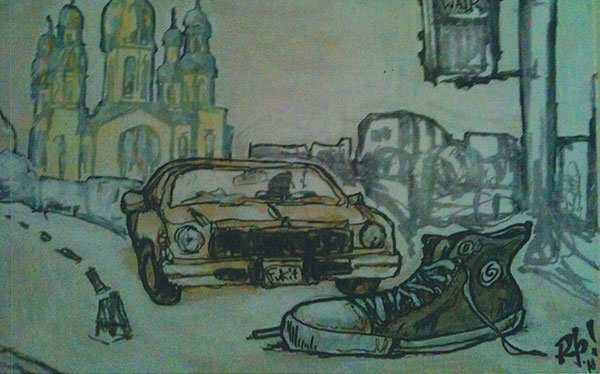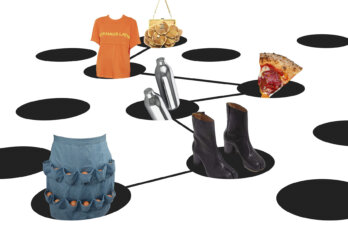The love that sits at the core of Katherena Vermette’s North End Love Songs—winner of this year’s Governor General’s Literary Award for English-language poetry—is not simple or serene, but pugnacious and ferocious, something to be alternately fled from as well as embraced. Set in and inspired by Winnipeg’s North End, Vermette’s poetry explores a landscape that she at once rejects in pieces like “Poised for Flight,” but elsewhere speaks of with a great sense of love and longing. Populated by riot grrls and heavy metal boys, these North End Love Songs are loud and heightened, but also possess a surprising vulnerability. The collection’s subjects are often wounded and sometimes disappear, as both the inner and outer landscapes that Vermette explores have the tendency to turn hostile. As young women transform into clever, daring birds, and memories are as strange and muffled as music heard through a wall, North End Love Songs embraces the difficulties, the stumbling and the groping, and all the chilly, ugly elements than can nonetheless combine into a sense of place and home.
Natalie Zina Walschots: When North End Love Songs was nominated for a GGLA, you described your reaction as shocked, that the honour as completely unexpected, and you first heard the news via social media while at brunch. How did you receive news of the win, and is the shock still present, or has it become something different?
Katherena Vermette: I was eating breakfast when I read about the nomination on my phone. Brunch makes it sound much fancier than it was! When I got the call about the win, I gasped. I didn’t have much time to process it because I had to figure out how to get myself to Toronto, and my life’s pretty jam-packed these days. I am not as stone-cold shocked as I was before, but I’m thankful I have so much to do so I can use up all my nervous energy.
Natalie Zina Walschots: What is it about North End Love Songs that you believe has caused the book too connect to its readers in such a deep way? What about this poetry strikes home?
Katherena Vermette: My friend Duncan has always told me the most personal is the most universal. This collection is an intensely personal story, but it is also nothing new. It’s about a young girl or woman struggling with identity and place. That pretty much describes the whole “Canadian experience” right there. More than that, it is a deeply indigenous story, and I think Canada is hungry for stories from and about its first people.
Natalie Zina Walschots: You’re a passionate and active member of the Writers’ Collective of Manitoba. Do you think this win will draw attention to other work being produced by your colleagues?
Katherena Vermette: Gosh, I hope so. I know and am blessed to spend time with so many amazing writers and storytellers. I would love to share them with anyone who wants to know them: Duncan Mercredi,Marie Annharte, Rosanna Deerchild, Beatrice Mosionier, and Trevor Greyeyes. That’s just in Manitoba and off the top of my head.
Natalie Zina Walschots: North End Love Songs is characterized by both a deep love of place and a resistance to it. Why did you think it was important to capture this sense of conflict in the book?
Katherena Vermette: Well, that’s home, isn’t it? We always love and hate our home. I have a complicated relationship with this place I call home. I spent years trying to run away, get away, and be any place else before I realized there was no other place I wanted to be, or could be, really. It’s like family, isn’t it? They annoy the crap out of us, but no one loves or knows us more.
Natalie Zina Walschots: In pieces like “treegrrl” and “parkgrrl,” it seems you are attempting to create an alternative to the very city-oriented, punk rock riot grrl persona that speaks more accurately to your Metis, Mennonite, and Winnipeg identity.
Katherena Vermette: I am rather proud of being a pseudo-riot grrl back in the day. I loved the ideas of the movement, the rejection of conventional definitions of “pretty” and the reclamation of the female body. Little girls are little riot grrls. My daughters were, anyway. They had no body image issues, were proud of what their bodies could do, and dressed however they flippin’ wanted—as long as I thought they were warm enough, that is. I like the word grrl. It’s a great word and means a lot to me. I also wrote a story “nortendgrrl” a few years ago, and wanted to connect this collection to that story if I could. You can find it in Manitoapow, a wonderful collection of indigenous writings from Manitoba.
Natalie Zina Walschots: As an avowed metalhead I have a soft spot for pieces like “heavy metal ballads” and “mixed tape.” How does music and poetry generally intersect in your work?
Katherena Vermette: Yay, metalheads! I think art begets art begets more art. Music makes poetry and makes more music, and then more poetry. Music is a fun theme to explore, especially when it’s early ’90s glam rock. My brothers and I were all headbangers of one kind or another. Mötley Crüe, AC/DC, G’n’R, even KISS, were big in my house. Heavy metal ballads are my favourite because they are vulnerable lyrics sung by the ultimate machismos—long hair and spandex pants aside. What a perfect image to show in poetry. Music is also a great way to show and define a time and place. We all remember what we were listening to when those memories happened, don’t we?
Natalie Zina Walschots: What does winning the GGLA for poetry mean for you as a poet? What does it mean for you personally?
Katherena Vermette: This award is incredibly validating and a huge honour, but gosh, I have no idea what it all means. I’m just trying to enjoy the ride as much as I can. That, and working, taking care of my kids, and occasionally remembering to breathe.
This interview has been condensed and edited for publication.





